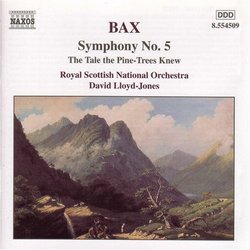| All Artists: Arnold Bax, David Lloyd-Jones, Royal Scottish National Orchestra Title: Bax: Symphony No. 5; The Tale the Pine-Trees Knew Members Wishing: 0 Total Copies: 0 Label: Naxos Release Date: 6/13/2000 Genre: Classical Styles: Forms & Genres, Theatrical, Incidental & Program Music, Historical Periods, Modern, 20th, & 21st Century, Symphonies Number of Discs: 1 SwapaCD Credits: 1 UPC: 636943450925 |
Search - Arnold Bax, David Lloyd-Jones, Royal Scottish National Orchestra :: Bax: Symphony No. 5; The Tale the Pine-Trees Knew
 | Arnold Bax, David Lloyd-Jones, Royal Scottish National Orchestra Bax: Symphony No. 5; The Tale the Pine-Trees Knew Genre: Classical
Yet another British music triumph for Naxos, David Lloyd-Jones, and the Royal Scottish National Orchestra. Bearing a dedication to Sibelius, the fifth symphony of 1932 is one of Bax's most personal, closely reasoned uttera... more » |
Larger Image |
CD DetailsSynopsis
Amazon.com Yet another British music triumph for Naxos, David Lloyd-Jones, and the Royal Scottish National Orchestra. Bearing a dedication to Sibelius, the fifth symphony of 1932 is one of Bax's most personal, closely reasoned utterances, its bardic splendor, slumbering tragedy, and epic thrust all most convincingly conveyed here. Not only is Lloyd-Jones scrupulously faithful to both the letter and spirit of the score, but he also has the happy knack of alighting on precisely the right tempo, and he never allows Bax's argument to sag in the way that occasionally afflicts Bryden Thomson's rival interpretation with the London Philharmonic for Chandos. What's more, he encourages some sensitive and sprightly playing from the RSNO (which certainly seems to enjoy making this mighty work's acquaintance). Completed the year before the symphony, the wintry tone poem The Tale the Pine-Trees Knew makes an apt coupling. Lloyd-Jones's performance possesses a clean-limbed vigor that contrasts strikingly with Thomson's more leisurely, wonderfully atmospheric view on Chandos. Astonishingly, Naxos has been sitting on these fine recordings for more than four years; let's just hope we don't have to wait as long again for future installments in Lloyd-Jones's absorbing Bax series. --Andrew Achenbach Similar CDs
|
CD ReviewsBax's Magnificent Nostalgia Thomas F. Bertonneau | Oswego, NY United States | 10/04/2000 (5 out of 5 stars) "The key to understanding the work of Sir Arnold Bax (1883-1953) comes from an episode in his childhood as described in his late-life autobiography "Farewell My Youth." Returning home with his family from a country outing when he was five or six, he happened to see the sun as it set behind a forested hill, and the spectacle of beauty (the sunlight refracted through the great mass of leaves) about to disappear (for the sunset is an ephemeral thing) impressed him deeply. When the last rays had withdrawn below the horizon and night had come on, Bax writes, he felt inexpressibly sad. Whether it is the solar primary about to quench itself in the West or the rural lifeways of Scotland and Ireland dissolving before the relentless march of industrial civilization - or his own departed youth - loss is the central, lyrical, experience in just about every important score by this imaginative and talented composer. That so lyrical a creativity should have taken up the rather abstract form of the symphony might strike one as unexpected; but then Bax went about writing his symphonies at just the time when the avant-garde had declared the form dead. Although record companies have given us sporadic attestations of Bax's symphonic achievement over the years (the Third ranks as the most-recorded), there has so far been only a single integral cycle, the one currently available on Chandos under Bryden Thomson. But the enterpreneurs at Naxos are in the midst of providing, at long last, a second such traversal, three installments of which have appeared. I confine myself here to the Fifth (1932), the most recent of these releases. Depending on the critic, either the Fifth or the Sixth (1934) is the peak of Bax's cycle of seven. I plump for the Fifth, at once the most austere and formally rigorous among its stablemates and the most poignant in its evocation of tragedy and loss. David Lloyd-Jones' account for Naxos with the Royal Scottish National Orchestra ranks, in my opinion, as the best recorded performance of a Bax symphony ever, with Sir Adrian Boult's old Lyrita version of the Sixth just nipping at its heels. The opening theme (clarinets, in the chalumeau register) of the First Movement hits just the right mood of enigma; the whole of the First Movement grows from this material, as Lloyd-Jones well understands, even when the Lento metamorphoses into an Allegro con Fuoco ("Fast and with Fire"). The middle-movement Lento begins with trumpet-fanfares over a shimmering undulation in the violins and violas; Lloyd-Jones gets it perfectly, bringing off the necessary crescendo-decrescendo as no one else has. A serpentine, slow solo for cor anglais harks back to the First Movement's opening gesture on clarinets. The Third Movement Finale makes use of what Bax called a "Liturgical Theme." This again stems from the basic intervals of the clarinet-motif of the First Movement. Bax puts it through an astonishing series of metamorphoses until, in an orchestral unison unprecedented in the symphonic literature, it blazes forth in its original form, after which the symphony comes to a quiet end. The "Liturgical Theme" functions as the index, the sign, the trace, of an old order, a natural dispensation of things, which is incompatible with the modern (the too-shallow) present and so has disappeared. It is the blaze of the sunset, the slipping-away of one's youth, and the evaporation of old ways of life that had exercised their rhythm, their ethos, for centuries. Bax's detractors accused him of loose thinking. This essentially mono-thematic is one of the most of powerful of our century and belies the facile judgment. Naxos serves up the coeval "Tale the Pine Trees Knew" as a filler. Magnificent. And for little more than a fiver." Another great Naxos recording! K. DANIELSON | New Castle, Pa USA | 08/08/2000 (5 out of 5 stars) "Ever since Chandos released their set of Bax symphonies on Chandos back in the 80's, I have felt that Bax was one of the great underrated and overlooked composers. Thanks to Naxos, who seem to blow the dust off so many forgotten classical masters, we now have a rival version of several Bax works in modern digital sound. I agree with the reviewer from Amazon. This recording is even BETTER than Bryden Thomsen's recording for Chandos. Never once did the tension and drama drop during the performance. An excellent recording, and an excellent way to introduce yourself to the work of Arnold Bax. Anyone at all interested in Sibelius or Vaughan Williams will not be dissappointed. At this cost, what do you have to lose? Get this!" Baxtantistic Santiago Barcon | Mexico city | 08/04/2000 (5 out of 5 stars) "I got the symphony 3 and then became aware of how good Bax is.This recording with the same director and orchestra makes a great continuation on the Bax series on Naxos, that I am looking forward to get complete.Symphony 5 is more mature, and being dedicated to Sibelius, with similarities to this composer. I also heard Wagner in a symphonic way.As a plus The tale the Pine-Trees knew is a wonderful symphonic poem.Recording is excellent and, I am never tired of stress it, at Naxos prices a must."
|

 Track Listings (4) - Disc #1
Track Listings (4) - Disc #1



